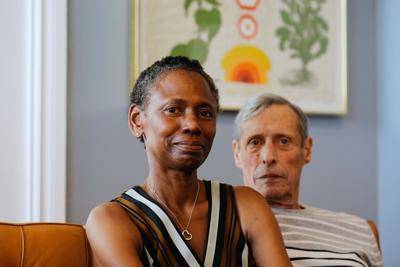During the pandemic, while working a high-profile┬Ājob at one of CanadaŌĆÖs largest communications companies, Kara Goldsmith sensed something was wrong.
Goldsmith, who was a lawyer, started experiencing symptoms affecting her performance ŌĆö memory loss, confusion and general cognitive decline.
Two years later, she lost her job, which the company said was because of restructuring.┬ĀIt wasnŌĆÖt until after she left that she was diagnosed with early-onset AlzheimerŌĆÖs disease.
Goldsmith made a claim for long-term disability benefits, but was denied by her insurer, Sun Life. The insurance company said her disability started after her coverage ended, adding there was ŌĆ£no continuous illness related absenceŌĆØ before that.
The ║ŻĮŪ╔ńŪ°╣┘═°woman is now suing the company for breaching the insurance contract. In its statement of defence, Sun Life says Goldsmith is not entitled to any of the relief claimed. When reached by the Star, the company said it could not comment on the case because it before the courts.
GoldsmithŌĆÖs husband and caregiver, Charles, says her story reflects how employers, insurance companies and the health-care system arenŌĆÖt equipped to support people with complex, progressive conditions like dementia, which can take years to diagnose.
A report by the Brainwell Institute in July found systemic issues in Canadian health care make it hard to get a timely diagnosis. The report found that only 41 per cent of family doctors feel prepared to diagnose dementia-related conditions ŌĆö which can progress slowly over many years ŌĆö and that the average wait time, from the onset of symptoms to receiving a formal diagnosis, is 21 to 28 months.
Goldsmith believes she was denied unfairly because her symptoms started while she was still employed and affected her ability to do her job. In medical records provided to the Star, which her family says were also sent to the insurance company, her doctors say itŌĆÖs ŌĆ£highly likelyŌĆØ her disease started manifesting while she was working, driven by an underlying neurodegenerative disorder.
GoldsmithŌĆÖs statement of claim accuses Sun Life of denying her benefits ŌĆ£in an unreasonable manner and in contravention of the terms of the policy.ŌĆØ
ŌĆ£The Defendant has acted in bad faith throughout and has denied Ms. GoldsmithŌĆÖs claim for unreasonable and superficial reasons,ŌĆØ reads the statement of claim.
She is seeking $500,000 or alternatively, a declaration that she was disabled during the time she was insured and is entitled to disability benefits retroactively, with interest.
In its statement of defence, Sun Life denies that Goldsmith is entitled to any of the relief claimed. The company says to qualify for long-term disability benefits, the employee must provide proof they were ŌĆ£totally disabled,ŌĆØ defined as being continuously unable to do the essential duties of the job due to an illness, while they were covered by the insurance policy, and that they were undergoing appropriate treatment from when the disability started.
They say GoldsmithŌĆÖs claim was filed late and therefore barred by the terms of the policy, and that the medical evidence she provided did not prove she was ŌĆ£totally disabledŌĆØ according to the policy at any time prior to her termination.
In a statement, the Alzheimer Society of Canada said that while most insurance companies do cover AlzheimerŌĆÖs disease and other forms of dementia, they generally require a formal diagnosis, which can take years due to limited access to family doctors and dementia specialists in Canada.
It said there are no national statistics on how often disability claims for dementia are denied, as private insurers donŌĆÖt publish that information.
ŌĆ£What we do know, from the families who contact us, is that delays in diagnosis can leave people particularly vulnerable in insurance frameworks that were not designed with cognitive decline in mind,ŌĆØ said Sian Lockwood, with the Alzheimer Society of Canada.
Saskia Sivananthan, CEO and founder of the Brainwell Institute, said being denied for disability insurance coverage is particularly common for people with young-onset dementia.
When Goldsmith first started feeling off, she thought she was experiencing symptoms of menopause.
ŌĆ£ItŌĆÖs not very common when you’re 58 to say ŌĆ” I must have Alzheimer’s,ŌĆØ her husband said.
Aman Chaggar, a Toronto-based lawyer at Whitten & Lublin with expertise in disability insurance claims, said he frequently comes across cases involving people with complex mental health conditions where thereŌĆÖs a prolonged period before the patient receives a diagnosis.
ŌĆ£There’s referrals, there’s testing, there’s assessments, there’s specialist appointments, all that stuff takes time,” he said. “ThatŌĆÖs part of the fault of our system right now┬ĀŌĆö that it takes too long to get things done.”
While he has dealt with many cases involving mental health conditions, he sees fewer cases specific to AlzheimerŌĆÖs and dementia. He said people who are experiencing cognitive decline can be at a particular disadvantage when navigating the system, especially if they donŌĆÖt have family support.
ŌĆ£There’s a significant difference in the bargaining power between the two parties. You have somebody who’s a vulnerable person, who’s trying to figure out what’s going on with them ŌĆ” I would imagine that there’s probably a decent (amount) of people who say I don’t want to bother with this.ŌĆØ
GoldsmithŌĆÖs husband said losing an income and being denied benefits as their expenses skyrocket due to her care has been devastating for the family.
He said they decided to share her story because they believe there are many other Canadians with AlzheimerŌĆÖs or other forms of dementia in similar predicaments.
ŌĆ£What about other Alzheimer’s patients who have no such backup through their family, friends ŌĆ” Where do they go?ŌĆØ






























To join the conversation set a first and last name in your user profile.
Sign in or register for free to join the Conversation